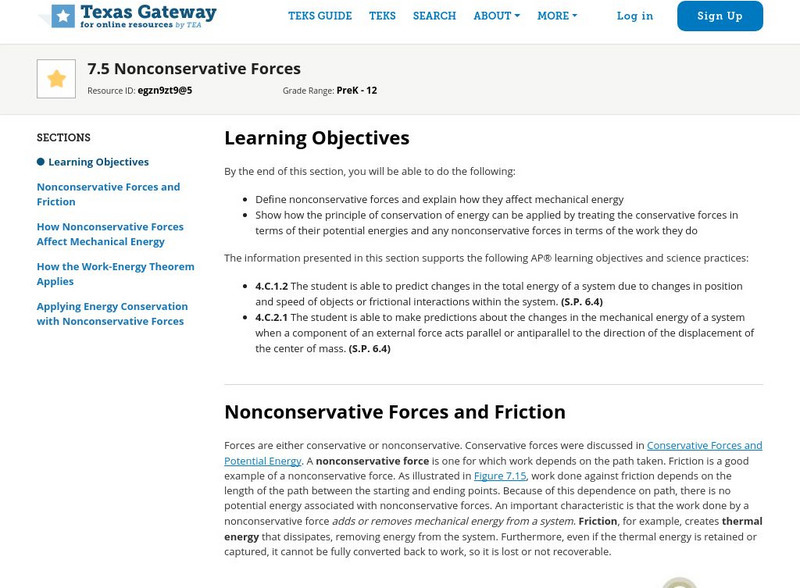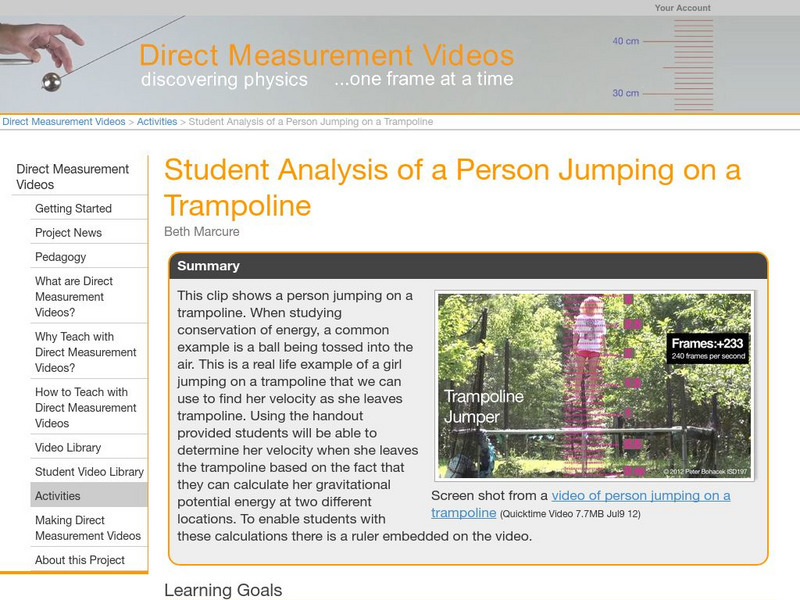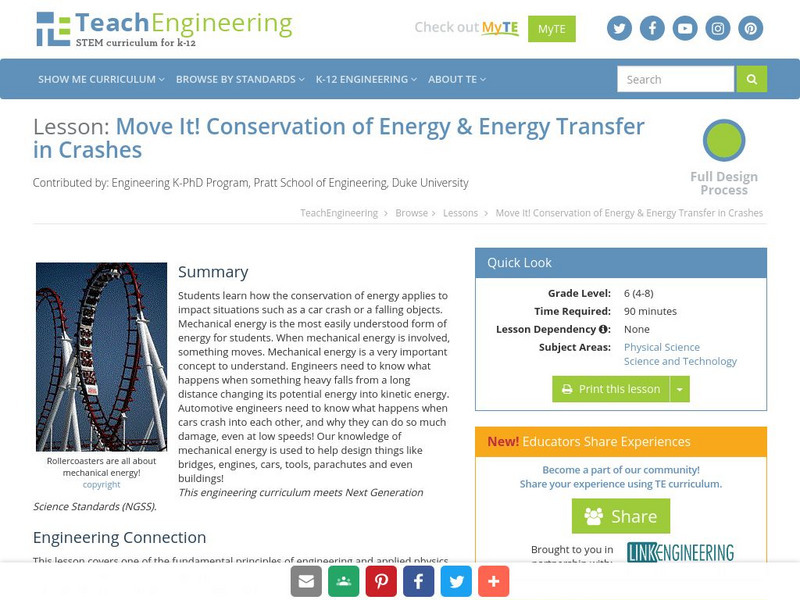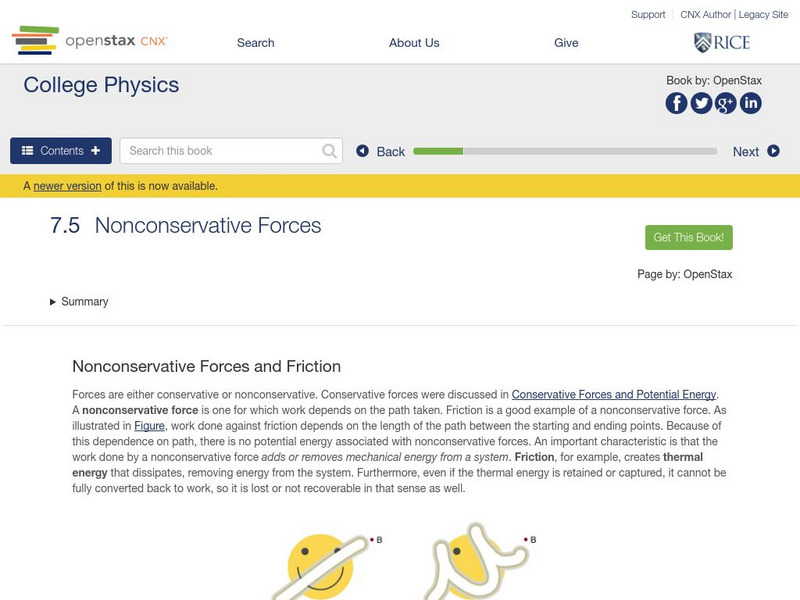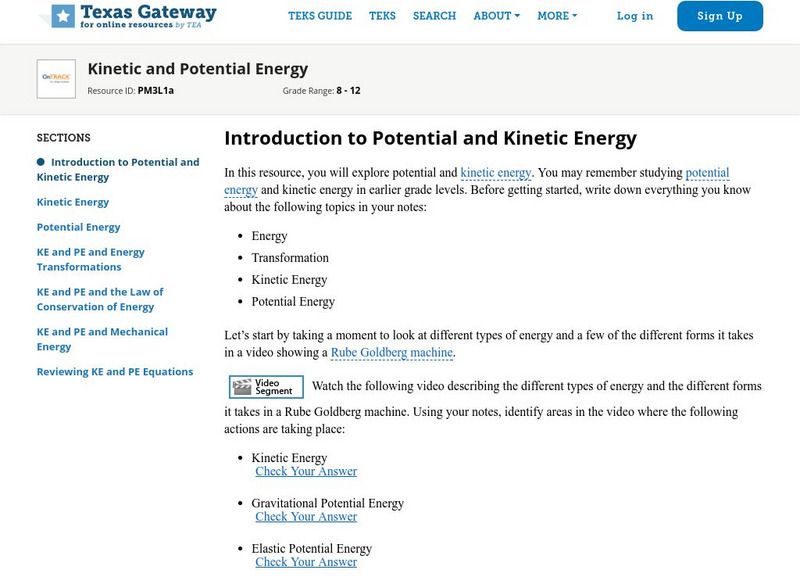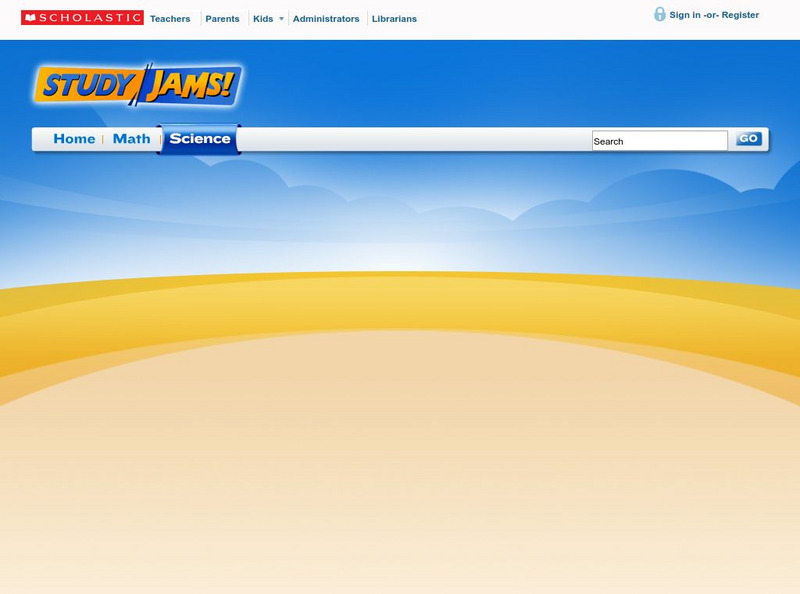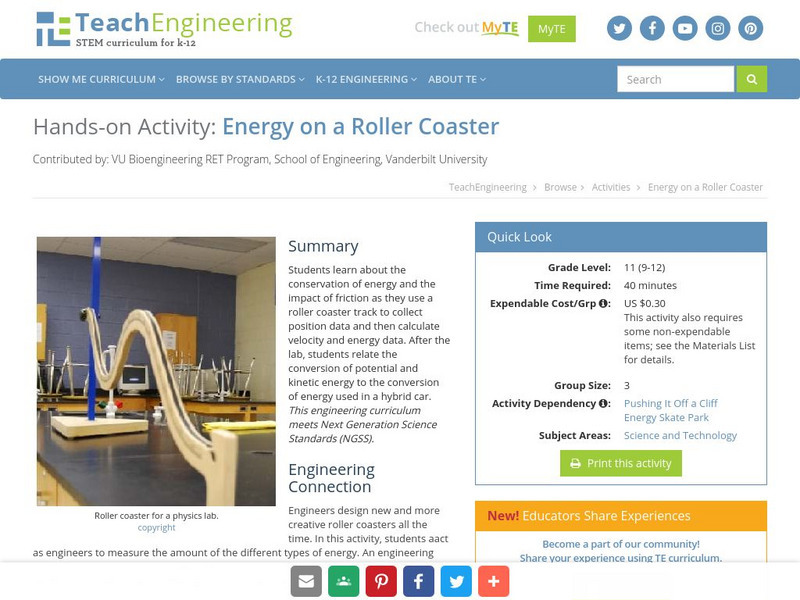TeachEngineering
Teach Engineering: Kinetic and Potential Energy of Motion
In this lesson, students are introduced to both potential energy and kinetic energy as forms of mechanical energy. A hands-on activity demonstrates how potential energy can change into kinetic energy by swinging a pendulum, illustrating...
Georgia State University
Georgia State University: Hyper Physics: Potential Energy
This site from Georgia State University Physics Department defines and explains the concept of potential energy. Using equations and graphics to illustrate the idea, it discusses the many types of potential energy (gravitational,...
Georgia State University
Georgia State University: Hyper Physics: Elastic Potential Energy
This site from Georgia State University Physics Department defines elastic potential energy and explains its origin. Provides an equation for computing elastic potential energy and an opportunity to practice solving problems with an...
Georgia State University
Georgia State University: Hyper Physics: Gravitational Potential Energy
This site defines and explains the concept of gravitational potential energy. Uses many equations and graphics to illustrate the idea. Provides an online computational practice set with immediate feedback.
CK-12 Foundation
Ck 12: Forms of Energy
[Free Registration/Login may be required to access all resource tools.] In this online lesson students will investigate examples of kinetic and potential energy and their transformations.
Science Buddies
Science Buddies: Put Your Water to Work: Using Hydropower to Lift a Load
Water creates a lot of energy, just look at the Grand Canyon. In this science fair project, you will demonstrate the power of water by converting the kinetic energy in moving water to mechanical energy, which will lift a small weight.
Canada Science and Technology Museum
Canada Science and Technology Museum: Background Information for Energy
Energy! What do you know about it? Use this terrific site to find out everything about it through a series of Q&As. Educators will find useful lesson plans at the related Teacher's site.
Georgia State University
Georgia State University: Hyper Physics: Kinetic Energy
This site from Georgia State University Physics Department defines kinetic energy and compares and contrasts it with other forms of energy. Provides an equation and links to further, more-detailed information.
Texas Education Agency
Texas Gateway: Nonconservative Forces
By the end of this section, you will be able to define nonconservative forces and explain how they affect mechanical energy, and to show how the principle of conservation of energy can be applied by treating the conservative forces in...
Science Education Resource Center at Carleton College
Serc: Student Analysis of a Person Jumping on a Trampoline
For this activity, young scholars learn about conservation of mechanical energy as they measure the velocity of a girl jumping on a trampoline using a direct measurement video with an embedded frame counter and ruler.
Physics Classroom
The Physics Classroom: Work and Energy: Energy Transformation on Roller Coasters
Using a roller coaster as an example, the transformation of mechanical energy from the form of potential to the form of kinetic and vice versa is explained and illustrated in the animation.
TeachEngineering
Teach Engineering: Move It!
Mechanical energy is the most easily understood form of energy for students. When there is mechanical energy involved, something moves. Mechanical energy is a very important concept to understand. Engineers need to know what happens when...
OpenStax
Open Stax: Nonconservative Forces
In the following interactive students will begin to define nonconservative forces and explain how they affect mechanical energy. They will show how the principle of conservation of energy can be applied by treating the conservative...
Texas Education Agency
Texas Gateway: Kinetic and Potential Energy
Given diagrams, illustrations or relevant data, students will identify examples of kinetic and potential energy and their transformations.
University of New South Wales (Australia)
University of New South Wales: School of Physics: Physclips: Energy and Power
Learn about energy and power in this learning module that contains videos and animation.
Texas Education Agency
Texas Gateway: Forms of Energy
Given diagrams, illustrations, or descriptions, students will identify the types of energy.
FT Exploring
Ft Exploring: What Type of Energy Is It?
How many types of energy are there? Are there many forms of energy, such as electrical, mechanical, and chemical? Or are there really just two types of energy - kinetic energy and potential energy? Here you can learn about these...
Scholastic
Scholastic: Study Jams! Science: Matter: Energy & Matter
A video and a short quiz on the different forms of energy, and how energy moves or changes matter.
Physics Classroom
The Physics Classroom: Work and Energy: How High Will It Go?
This animation depicts the motion of a young child sliding across the snow on a sled. Students can analyze the work and energy involved in this scenario.
TeachEngineering
Teach Engineering: The Car With a Lot of Potential
Working in teams, students perform quantitative observational experiments on the motion of LEGO MINDSTORMS NXT robotic vehicles powered by the stored potential energy of rubber bands. Students understand that through the manipulation of...
TeachEngineering
Teach Engineering: Energy Forms and States Demonstrations
Demonstrations explain the concepts of energy forms (sound, chemical, radiant [light], electrical, atomic [nuclear], mechanical, thermal [heat]) and states (potential, kinetic).
Georgia Department of Education
Ga Virtual Learning: Physical Science: Work and Energy
Find out about simple machines, calculate the mechanical advantage and efficiency of machines, differentiate potential and kinetic energy, and learn ways to use energy more efficiently.
TeachEngineering
Teach Engineering: Energy on a Roller Coaster
This activity utilizes hands-on learning with the conservation of energy and the interaction of friction. Students use a roller coaster track and collect position data. The students then calculate velocity, and energy data. After the...
Physics Classroom
The Physics Classroom: Energy Conservation on an Incline
This site is a discussion and animation about whether the total mechanical energy of a cart rolling down an incline is conserved, which can be determined if there are any external forces acting upon it.








